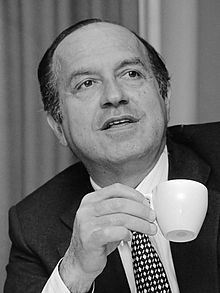|
Edouard Saouma
Edouard Victor Saouma (6 November 1926 – 1 December 2012) was a Lebanese civil servant who served as Director General of the Food and Agriculture Organization of the United Nations (FAO) for three consecutive terms from 1976 to 1993.[1] Early careerAfter completing his studies at the École Nationale d'Agriculture de Montpellier (1949–1952), Saouma served as Director of the Agriculture Experimental Center of the Bekaa Valley, Lebanon (1952–62), Deputy Regional Representative of FAO for Asia and the Far East (1962–65), Director of the Land and Water Development Division of FAO (1965–75), and then Director General of the FAO. Camberley GroupThe nations that wanted to replace Saouma in the 1987 elections concerted their strategy in secret meetings of what is known as the Camberley Group,[2] after the town in England where the first meeting was held. The original members of the group were Australia, Britain, Canada, Denmark, Finland, West Germany, Japan, the Netherlands, Norway, Sweden and Switzerland. The U.S. was at first excluded because of the strong support given to Saouma by its ambassador Millicent Fenwick (a former member of Congress). This effort proved futile, as Saouma was re-elected.[3] LegacySaouma's tenure at FAO was marked by dedication to (and support from) third world countries,[4] his independence from major donor countries, US, Canada, Australia, and his numerous initiatives.[citation needed]. Yet many food experts believe that Saouma was more successful than he might have been otherwise in identifying the F.A.O. with the fight against global hunger.[5] Saouma's controversial leadership was assessed by an unclassified State Department message[6] to American diplomatic posts which stated of Saouma: He has done an excellent job managing the organization and keeping internal program discipline. He has increased F.A.O.'s capacity to deliver technical assistance and strengthened its early warning system. Under his leadership, F.A.O. has steadily decreased the proportion of its budget which is devoted to administrative expenditures. However, under Saouma's leadership FAO lost a substantial share of support from the United Nations Development Programme (UNDP) and from several industrial nations. This was caused by Saouma's withdrawing FAO Country Representatives from UNDP offices the world over and establishing separate FAO offices; UNDP reacted by executing its own agriculture projects, instead of financing their execution by FAO. Saouma also allowed FAO Fisheries Department to focus efforts and publicity on promoting and supporting the 200-mile "exclusive economic zones" of coastal nations. This led to exclusion or increasing the operational costs of major distant-waters fishing fleets that as a rule belonged to industrial nations and major FAO donors. The consequence was substantial reduction of donor-financed FAO fisheries projects. Finally, Saouma considerably increased the number of professional staff from developing countries at the expense of professionals from developed ones, which resulted in certain decline in FAO's general level of experience and expertise. In recognition of his decisive role, the FAO Conference established in November 1993 the Edouard Saouma Award[7] Honors
Honorary Doctorates
References
Wikimedia Commons has media related to Edouard Saouma. |
||||||||||||||||||||||||||||||
Portal di Ensiklopedia Dunia
